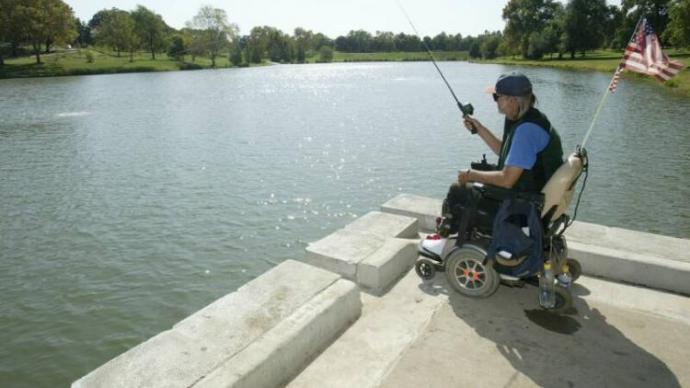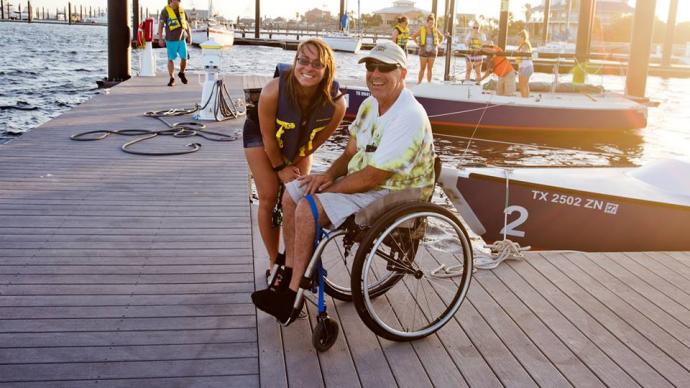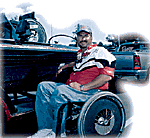
In 1985, David Hudson was enlisted in the U.S. Air Force, working as a heavy-machinery operator at the base in Little Rock, Ark. On weekends, the 21-year-old rappelled the gorges and rock cliffs not far from the base. One evening, Hudson and friends were camped atop a cliff, and as he was gathering firewood, a single misstep changed his life forever.
"If I hadn't been there so many times, I probably would have been more apprehensive and wouldn't have been so close to the edge," Hudson said. "But I felt I knew every nook and cranny."
Hudson fell 165 feet and survived, but he broke two vertebrae, paralyzing himself at the waist. "The doctor said I'd be in the hospital for eight months," Hudson said. "Being the kind of person I am, I had had enough after five months."
Starting a new chapter in life and acclimating to a wheelchair, Hudson became reacquainted with the pastimes of his youth by fishing from the bank with friends. The trouble, he found, was finding accessible places for his wheelchair and a smooth, flat place to park it. With the help of his cousin, Hudson began bass fishing from a small boat, which opened vast stretches of water instead of narrow swaths reachable from the shore. When Hudson heard and read about the Paralyzed Veterans of America National Bass Trail, a tournament series for anglers with disabilities, he thought, "Maybe I'll try that next year."
The time came in 1991, when Hudson began fishing competitively. Since then, his accomplishments include winning two events in 2000 on the PVA National Bass Trail; taking one second and a top 10 in 2002 with the American Bass Fishing Association; placing 26th in a Wal-Mart Bass Fishing League event; and competing last year in the Ranger M1 tournament. Working with engineers at Ranger Boats, Hudson has developed what he calls a power flipping deck, which is an electric lift system that gets him and his wheelchair to the front deck. Locking devices hold the chair in place while he steers his Minn Kota Genesis trolling motor with his hands.
"The biggest thing to overcome with a disability such as paralysis is to get around in the boat," said Hudson, now 39 and living in Rogersville, Ala. "Without legs, the trick is to get from the wheel of a bass boat to the deck and to use the trolling motor. As far as getting out there with other able-bodied anglers, pretty much you're on the same playing field once you get to the front of the boat."
Hudson is not alone. He is among a growing number of competitive anglers with disabilities who compete in bass tournaments everywhere from the PVA tour to the BFL, and many of these anglers have aspirations to enter the Wal-Mart FLW Tour and the EverStart Series. Many compete in hopes of becoming a touring pro, but most do it for the competition - another challenge to face and overcome in the game of life. More than anything, though, they do it for a love of fishing.
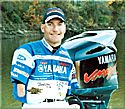
A mental edge
"The main reason I tournament fish," said 24-year-old Clay Dyer of Hamilton, Ala., "is because my life has always been a competition with the situation I'm in, being the way I was born. To me, it's the fact that I know I'm competing against the best anglers in the nation. By no means am I at that level. My main perspective is that it's such a challenge to fish at that level. I don't want to do it for a year or two and then have the fire burn out."
Indeed, Dyer has a fire inside. Dyer was born without legs and without a left arm. His right arm extends to his elbow. Nevertheless, Dyer flings a bait-caster by clenching it between his cheek and collarbone, cranking the reel with his right arm.
"I can make any cast I need to make," Dyer said. "I can cast left or right. I can pitch and flip - I do that a lot. I can pitch and flip as easily as I can throw a big crankbait. It took a lot of practice - a year or two - to learn a lot of the casts."
Dyer started fishing at 5 years old and began tournament fishing with older friends at 12 years old. By 1996, when he was a senior in high school, Dyer was fishing full time, and since then, he has won 30 team and regional tournaments. His next goal is to fish FLW Tour and EverStart Series events. Dyer's hopes are buoyed by a full roster of sponsors, including Yamaha, Minn Kota and Plano. He also splits fishing time with inspirational speaking engagements.
"When you meet the guy and see how determined, how outgoing and how willing to tell his story he is, it's that much better," said David Simmons, field promotions coordinator for Yamaha Marine Power Group. "As far as his marketing and promotional abilities, they're excellent regardless of his abilities or disabilities."
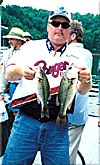
Another angler with determination and ambition is Brett Ketchum of Little Rock, Ark. Last year Ketchum fished the National Bass Association of the Deaf circuit and the full BFL Arkie Division, taking seventh at Lake Ouachita. "I don't think (my lack of) hearing affects my fishing at all," Ketchum said. "That's why I chose fishing rather than hoops or baseball, which required hearing. I only need help from my partner for the flight call.
"My events for 2003 should be the same with the BFL," added Ketchum, a cabinet maker with Raytheon Aircraft. "I'm still looking forward to the EverStart Series. If I get a chance, I will go for it!"
Going for it - it's a common theme among anglers with disabilities. In a way, their fishing is not unlike any other aspect of their lives, with day in, day out obstacles to overcome. The way they look at it, one of the most crucial components of any aspect of their lives is the mental edge.
"I've always had a lot of willpower," Dyer said. "I'm not trying to brag or boast. When something gets in front of me, I'm going to go 110 percent until I accomplish it."
|
Image

|
|
Image

|
|
Image

|
Fishing therapy
On another level, the pure, simple joy of fishing - or of any sport, for that matter - and its therapeutic values cannot be understated. One champion of such a notion is the PVA, a veterans-service organization which was founded after World War II. The PVA's membership now totals 20,000, with 36 chapters and 17 sporting programs. Among them are bowling, trapshooting and, of course, fishing. The seven-tournament PVA National Bass Series, including the Grand National Championship, is a fertile training ground not only for anglers who aspire to fish at a higher level but also for anyone who wants to tap into the restorative powers of the water.
"A lot of our anglers have gone on to the FLW Tour and the EverStart Series," said Geoff Hopkins, associate director of sports recreation for Paralyzed Veterans of America. "We're trying to grow them in a sense and get them back to their lives prior to injury or disease. We're trying to get them back fishing. For a lot of these guys, fishing can change their lives. Fishing is definitely therapy - a process to get them back into the lives they were used to."
Despite the name, PVA's angling events are not limited to veterans. A case in point is Jimmy Lankford of Henry, Tenn., who has fished the PVA National Bass Trail for a decade but was never in the armed services. Lankford was injured in 1983 while racing a three-wheel all-terrain vehicle in a sanctioned event. He has partial use of his legs, which allows him to stand or lean against a boat seat while he fishes. Fishing is a pastime he embraced at the competitive level in 1991 even though he had never entered a tournament. Times have changed for Lankford, who placed sixth in a BFL event last year and 13th as a co-angler in the Ranger M1, and he hopes to fish full time someday at the elite level.
"Why fishing?" asked Lankford. "I just love the outdoors. Being out there fishing is a big part of my life, and being out in a boat is a great way to do it. And when you go out and make a thousand casts, the next cast is when you might get that trophy fish or tournament-winning fish. The next cast could always be it."
Lankford, then, is not unlike any other angler. The chances to win, place and compete depend on the electric tug at the end of the line, which is the common ground for all anglers at all levels, pursuing any species. Hope, indeed, springs eternal at any given moment. The next cast could always be it.
| Accessibility for all |
Fishing is an activity for everyone, a truism given statistical credence by the 2001 National Survey of Fishing, Hunting and Wildlife-Associated Recreation, which is the most recent study produced by the U.S. Bureau of the Census, the U.S. Department of the Interior and the U.S. Fish and Wildlife Service, among other agencies. The survey says that 1.9 million anglers with disabilities spent more than 44 million days fishing in 2001. Much of this activity could not have been accomplished without state programs and private organizations that provide fishing opportunities for anglers with disabilities. Some of these organizations are listed below.
|
Content provided by Bass Fishing Magazine, the official publication of FLW Outdoors

